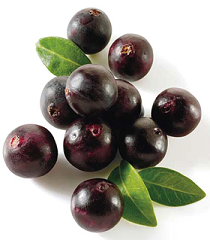Acai
The acai (ah-sigh-EE) berry is a grape-like fruit harvested from acai palm trees, which are native to the rainforests of South America. Acai berries are widely touted as a so-called superfood, with proponents claiming that they are helpful for a variety of health concerns, including arthritis, cancer, weight loss, high cholesterol, erectile dysfunction, detoxification and improving general health.
Contents
Uses
- Many fruits besides acai berries provide antioxidants and other nutrients that are important to your health. But if you’d like to try acai, check your local health food or gourmet stores — acai can be consumed raw, in tablet form, in beverages such as juice, smoothies or energy drinks, or in other food products such as jelly or ice cream.
- Beauty Products: Some cosmetics and beauty products include acai oil because of its antioxidants. Acai oil may be a safe alternative to other tropical oils used in beauty products, such as facial and body creams, anti-aging skin therapies, shampoos, and conditioners. When acai oil is processed and stored long-term, the antioxidant levels remain high.
- Digestive Tract: Acai extracts have been used by Amazon basin tribes as the treatment remedy for diarrhea, parasitic infections, hemorrhages, and ulcer treatment.
- Fever: A kind of decoction obtained from crushed seeds has been in use for the treatment of fever.
- Decoction obtained from the roots has been used in the treatment of menstrual pain, liver diseases, malaria in Peruvian culture.
Benefits
- Very High in Antioxidants: Some studies show that acai fruit pulp is even richer in antioxidants than cranberries, raspberries, blackberries, strawberries, or blueberries.
- People eat acai berries to address various health conditions. But so far, acai berries have no known health benefit that’s different from similar fruits.
References
Source: WEBMD; Reviewed by David Kiefer, MD on August 03, 2014, www.WebMD.com

